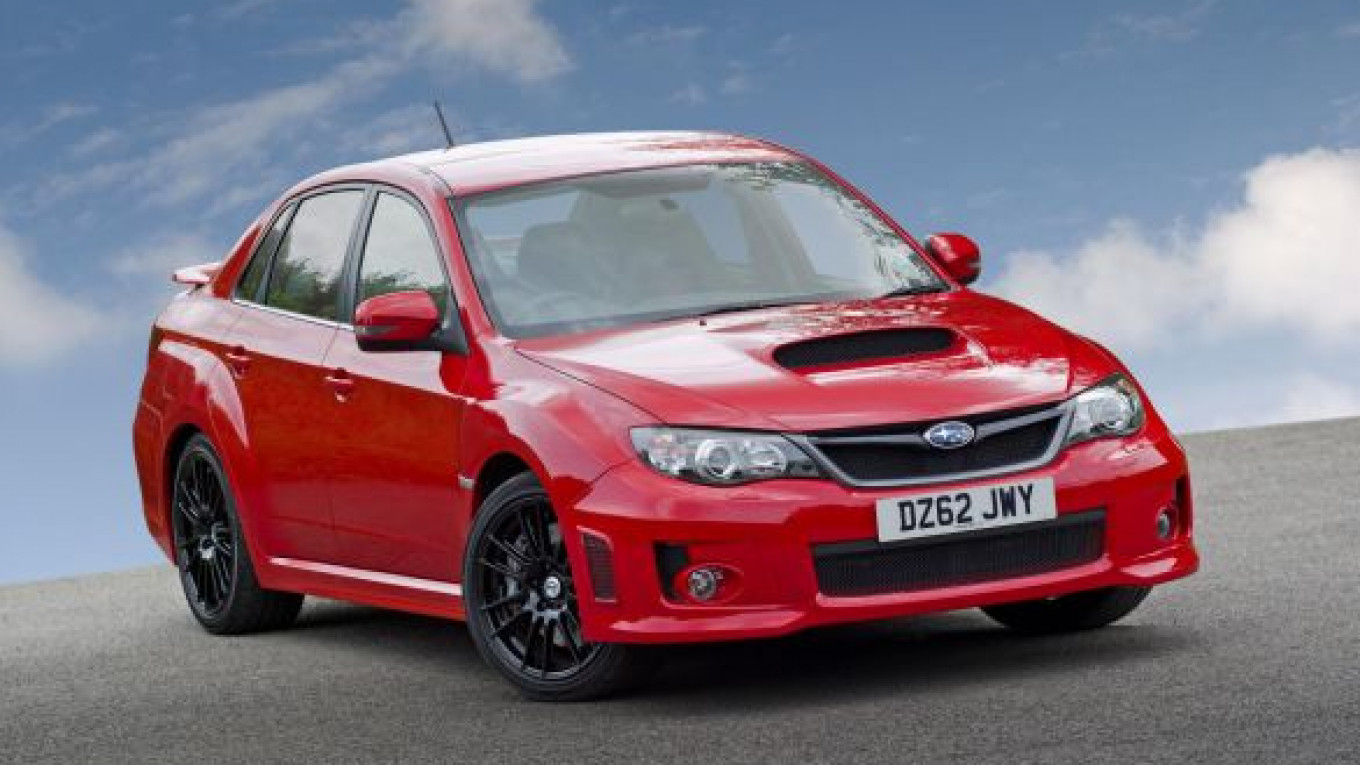Editor's note: Wheels is a new section featuring car reviews.
There is a fundamental difference between men and women, aside from the obvious, of course. It is that both view cars in completely contrasting ways. Where men have memories like Top Trumps cards, easily reciting top speeds and power, ladies remember the size and color.
This becomes even clearer when I drive the Subaru WRX STi to the office. "Nice red car, and I like the black alloys," says a young female colleague. "Bet it's a 2.5-liter with 300 brake horsepower," adds the warehouse manager. I rest my case. It's interesting that women seem much more interested in aesthetics. And they say men are shallow.
Subaru WRX STi
Price from: 2 million rubles ($63,000)
Engine: 2.5 liter 16-valve
Power: 295 bhp
0- 100 kph: 5.2 seconds
Top speed: 254 kph
Economy: 11.4 kpl
Source: Subaru
On that point of design, the macho bulges such as the bulbous air vent protruding from the hood and the flared wheel arches are reminiscent of Russian bodybuilder Ramzes Tlyakodugov's flexed muscles. This is a far more obvious muscle car than the Volvo S60 T6, which boasts similar performance but in a more understated package. The WRX feels like a driver's protection. Nobody is going to mess with you. This vehicle doesn't need to be driven fast to be appreciated, either.
Once you've stopped gaping at the dazzling exterior, the hard Recaro leather sports seats beckon. It's a comfortable cabin, quite low down, and wife Caroline mentions how front occupants have to be slim to be comfortable; too much weight and the Recaro seats would not hug so well. At work, the warehouse manager confirms this point, recalling how his mother could not sit comfortably in the family's old Impreza and that was the reason it had to be sold. The Impreza became famous when Colin McRae won the world rally championship in 1995.
The WRX builds on the Impreza's successes — it is most definitely a young man's car, which becomes clear on pressing the ignition switch. There's a roar from the twin double exhausts not dissimilar to those magnificent Maseratis. It is a dominant sound, which certainly adds to the sporty feel and is something that enthusiasts will enjoy listening to instead of the radio.
Moving off, it takes a little while to familiarize myself with the clutch, which doesn't need to rise much for a gear change. The six-speed shift is slick, as you would expect.
The new Subaru WRX STi provides a speedy option for family drivers, combining power and design with a variety of practical features.
It features SI-Drive (Subaru Intelligent Drive) that has three modes. The Sport Sharp is the most responsive and this is the mode for demanding driving, quite literally pushing occupants back into their seats. Sport makes the car a little less sharp while intelligent mode is for more restrained driving. In this mode, the Boxer engine is docile and lethargic; I certainly prefer the Sport Sharp, which sees this brute shoot from 0 to 100 kilometers per hour in just 5.2 seconds and onto 254 kilometers per hour. All wheel drive is a definite reassurance and provides excellent road holding.
As is the way with all performance cars the fuel gauge plummets during demanding driving, but it returns a reasonable 12 to 15 kilometers per liter during a more relaxed motorway run. The handbrake close to the driver's left-hand side takes a little getting used to but it is actually a helpful position giving added control for hill starts.
The WRX STi, which surprisingly sells for around 2 million rubles, is not just a performance car but a practical family sedan. There is room for five, and daughters Harriett and Heidi sit quite comfortably in their car seats in the rear. The child lock is easy enough to engage and the trunk is large enough for the weekly shop.
Other car reviews can be found at testdrives.bizVideo of the test drive.
Contact the author at [email protected]
A Message from The Moscow Times:
Dear readers,
We are facing unprecedented challenges. Russia's Prosecutor General's Office has designated The Moscow Times as an "undesirable" organization, criminalizing our work and putting our staff at risk of prosecution. This follows our earlier unjust labeling as a "foreign agent."
These actions are direct attempts to silence independent journalism in Russia. The authorities claim our work "discredits the decisions of the Russian leadership." We see things differently: we strive to provide accurate, unbiased reporting on Russia.
We, the journalists of The Moscow Times, refuse to be silenced. But to continue our work, we need your help.
Your support, no matter how small, makes a world of difference. If you can, please support us monthly starting from just $2. It's quick to set up, and every contribution makes a significant impact.
By supporting The Moscow Times, you're defending open, independent journalism in the face of repression. Thank you for standing with us.
Remind me later.






